Tribunal Statistics Quarterly: July to September 2023
Published 14 December 2023
1. Main Points
This publication presents tribunals statistics for the latest quarter (July to September, Q2 2023/24), compared to the same quarter of the previous year.
This publication does not include receipt, disposal and caseload outstanding figures for the Upper Tribunal Immigration and Asylum Chamber (UTIAC) due to this tribunal being migrated to new case management systems. The data will be made available as soon as possible, and once the data is quality assured. The total of the remaining jurisdictions is referred to in this publication and accompanying tables as the ‘Interim Total’ and has been provided to allow like-for-like comparisons over time[footnote 1].
| The interim[footnote 1] overall volume of receipts, disposals and open cases increased | In July to September 2023 His Majesty’s Courts & Tribunals Service (HMCTS) recorded a 5% increase in the interim[footnote 1] total for receipts, and a 20% increase in the interim[footnote 1] total for disposals, when compared to the same quarter in 2022. The interim[footnote 1] total for open cases increased by 4% to 649,000 over the same period. |
| SSCS receipts, disposals and open cases all increased. | Compared to the same period in 2022, Social Security and Child Support (SSCS) receipts increased by 4%, disposals increased by 16% and open cases increased by 27%. The increase in receipts was driven by increases in Universal Credit and Attendance Allowance (by 35% and 87% respectively). The increase in disposals was driven by increases in Personal Independence Payment and Universal Credit (by 22% and 25% respectively). |
| FTTIAC receipts, disposals and open cases all increased | FTTIAC receipts, disposals and open cases all increased (by 10%, 7% and 21% respectively) in July to September 2023 compared to the same period in 2022. |
| Employment Tribunal receipts and disposals increased, while open cases decreased marginally | Single Employment Tribunal (ET) receipts, disposals, and open cases all decreased, by 1%, 3% and 17% respectively in Q2 2023/24, compared to the same period a year ago. In Q2 2023/24 Multiple ET receipts, disposals, and open cases all increased, by 8%, 78% and 1% respectively compared to Q2 2023/24. |
| Gender Recognition Certificates receipts, disposals and open cases increased | This quarter there were 370 Gender Recognition Panel (GRP) applications received, 465 disposals and an outstanding caseload of 736. GRP receipts, disposals and outstanding caseload increased (by 4%, 69%, and 43% respectively) in Q2 2023, compared to the same period in 2022. |
| SEN appeals and disposals up 24% and 29% respectively | In the academic year 2022/23, HMCTS tribunals recorded 14,000 registered appeals in relation to SEN, an increase of 24% compared to the prior year. In the same period, 12,000 SEN appeals were disposed of, an increase of 29% on 2021/22. This is evidenced by the outstanding caseload for the SEND tribunal which has increased by 20% from the end of September 2022 to the end of September 2023. |
For feedback related to the content of this publication, please contact us at CAJS@justice.gov.uk
We are considering streamlining the publication to include only the tables that are being used. We are therefore seeking to understand which tables our stakeholders use to help us prioritise improvements. You are invited to please complete the following online survey, by 31st March 2024. This should take 5-10 minutes.
2. Statistician’s Comment
This quarter disposals have shown a 20% increase compared to the same period in 2022/23, whilst volumes of receipts and outstanding caseload have also risen. The increase in both receipts and disposals is driven by upturns in the level of SSCS and ET claims, whilst the increase in receipts is also driven by rises in FTTIAC claims. The increase in outstanding caseload is predominantly driven by rises in SSCS which is likely to be caused by receipts exceeding disposals in 7 of the latest 8 quarters reported.
Applications for gender recognition certificates have also continued to increase gradually this quarter while disposals were at their highest level since 2009/10. This resulted in a decrease in cases outstanding compared to the previous quarter. Nine out of 10 cases disposed of were granted a full GRC this quarter.
Similarly, registered appeals in the SEND tribunal have continued a steady upwards trend from 3,100 in 2014/15 to 14,000 in 2022/23. The increase is likely due to the continued effect of Education Health and Care plan reforms introduced which extended the provision of support from birth to 25 years of age. In March 2023 the Department for Education published a SEND and Alternative Provision Improvement Plan designed to reduce the volume of cases taken to Tribunal through increased use of mediation and new guidance for local authority SEND casework teams.
3. Overview of Tribunals
Receipts interim[footnote 1] total was 86,000 and disposals interim[footnote 1] total was 83,000
In July to September 2023, HMCTS recorded a 5% increase in the interim[footnote 1] total for receipts, and a 20% increase in the interim[footnote 1] totals for disposals, when compared to the same quarter in 2022. Caseload outstanding interim[footnote 1] total increased by 4%, to 649,000, over the same period.
This publication does not include Upper Tribunal (Immigration and Asylum Chamber) data since Q2 of 2021/22 and Employment Tribunals data for Q1 2021/22 due to database migration as stated above. The total of the remaining jurisdictions is referred to in this publication and accompanying tables as the ‘Interim Total’ and has been provided to allow consistent year-on-year comparisons over time.
This summary bulletin focuses mainly on the Social Security and Child Support (SSCS) Tribunal, the First-tier Tribunal Immigration and Asylum Chamber (FTTIAC), and the Employment Tribunal as they made up the majority (76%) of tribunal interim[footnote 1] receipts in July to September 2023:
- Social Security and Child Support (SSCS) - 42% of receipts
- Employment Tribunal (ET) - 23% of receipts
- First-tier tribunal Immigration and Asylum Chamber (FTTIAC) - 12% of receipts
Figure 3.1: Receipts interim totals, Q2 2019/20 to Q2 2023/24 (Source: Table S_2)
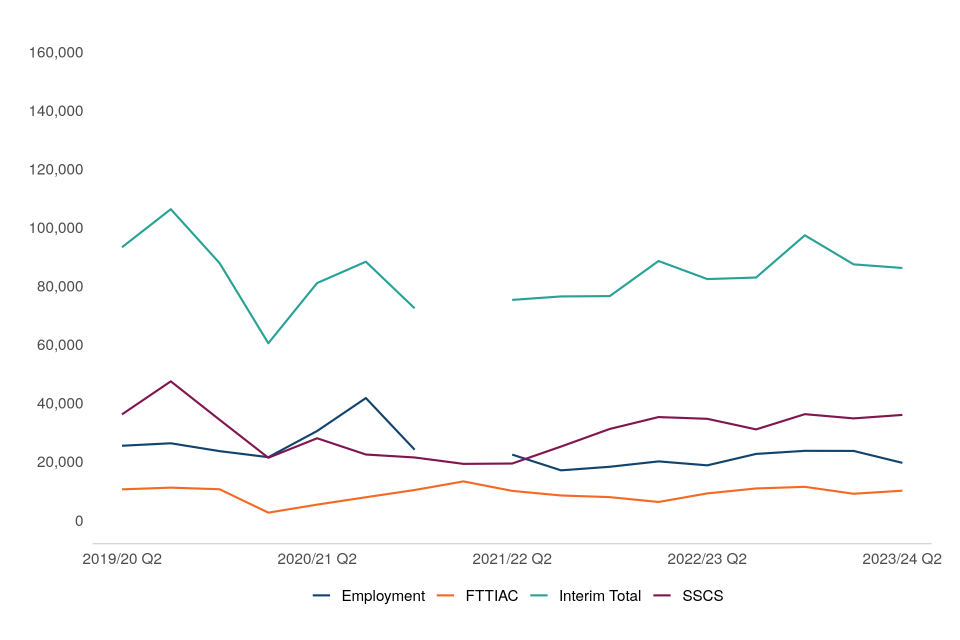
Figure 3.2: Disposals interim totals, Q2 2019/20 to Q2 2023/24 (Source: Table S_3)
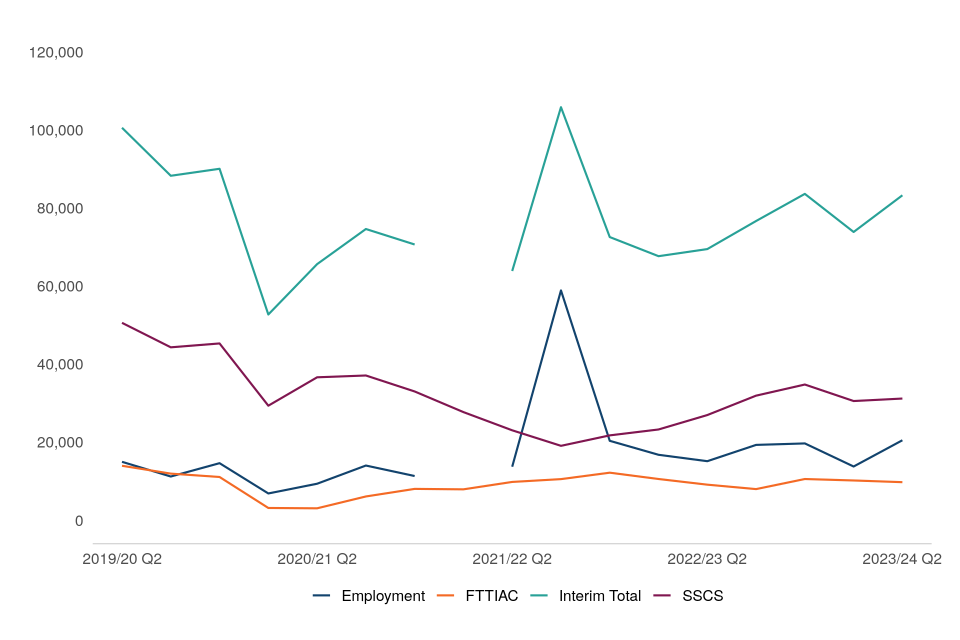
Figure 3.3: Caseload outstanding[footnote 2] interim totals, Q2 2019/20 to Q2 2023/24 (Source: Table S_4)
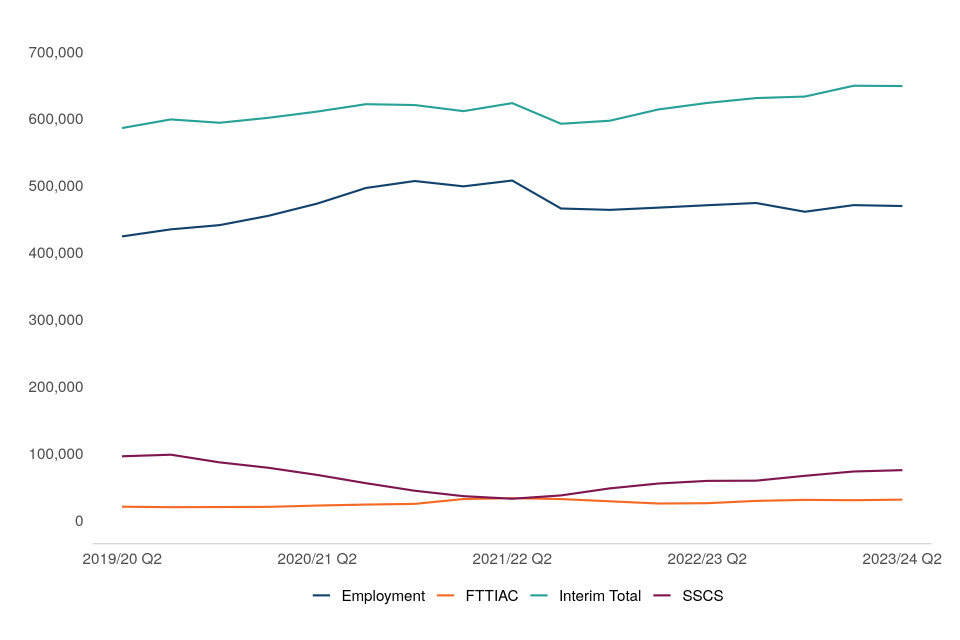
The charts above show the trends in receipts, disposals and caseload outstanding over the last five years for SSCS, FTTIAC, ET, and all tribunals overall (using the Interim[footnote 1] Total measure).
In July to September 2023, overall interim[footnote 1] receipts increased by 5% compared to July to September 2022. This was driven by increases in SSCS and FTTIAC (by 4% and 10% respectively).
Overall interim[footnote 1] disposals increased by 20% in July to September 2023 (to 83,000). The Employment Tribunal disposed of 35% more cases in Q2 2023/24 compared to Q2 2022/23. SSCS disposals increased by 16% over the same period.
4. Social Security and Child Support
From April 2023 the SSCS Tribunal started to list cases using a new Scheduling and Listing solution. This, alongside HMCTS migrating to a new Strategic Data Platform, has resulted in some cases heard and decided using this new listing solution not currently being included in the data above. Revised data will be published as soon as they are available.
SSCS receipts, disposals and open cases all increased.
Compared to the same period in 2022, Social Security and Child Support (SSCS) receipts, disposals and open cases all increased by 4%, 16% and 27% respectively.
Of the 31,000 disposals in Q2 2023/24, 63% were cleared at a hearing and of these, 61% had the initial decision revised in favour of the claimant (compared to 72% and 61% in the same period in 2022/23 respectively).
Figure 4.1: Social Security and Child Support receipts, Q2 2019/20 to Q2 2023/24 (Source: Tables SSCS_1)
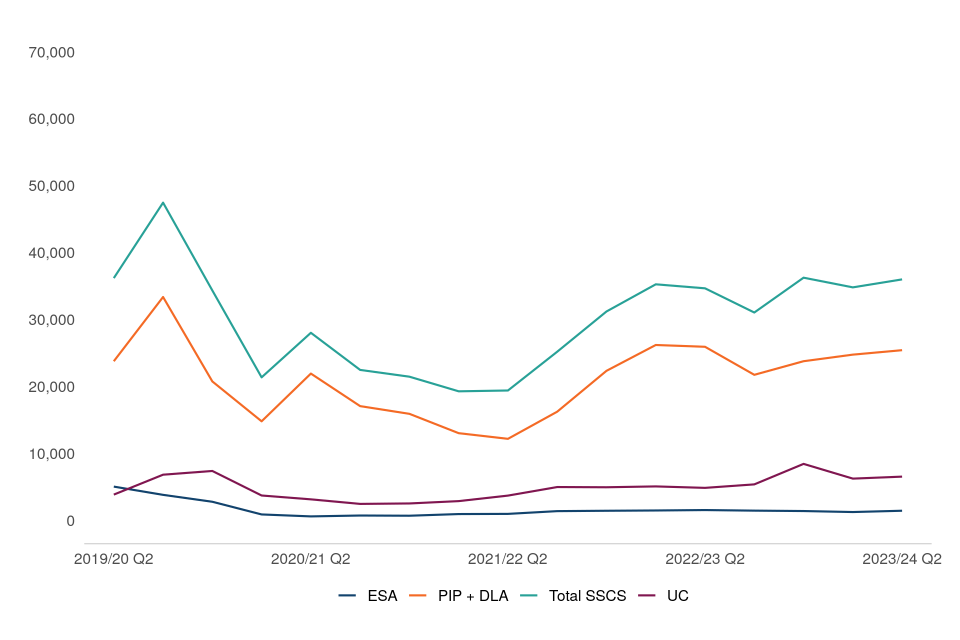
Figure 4.2: Social Security and Child Support disposals, Q2 2019/20 to Q2 2023/24 (Source: Tables SSCS_2)
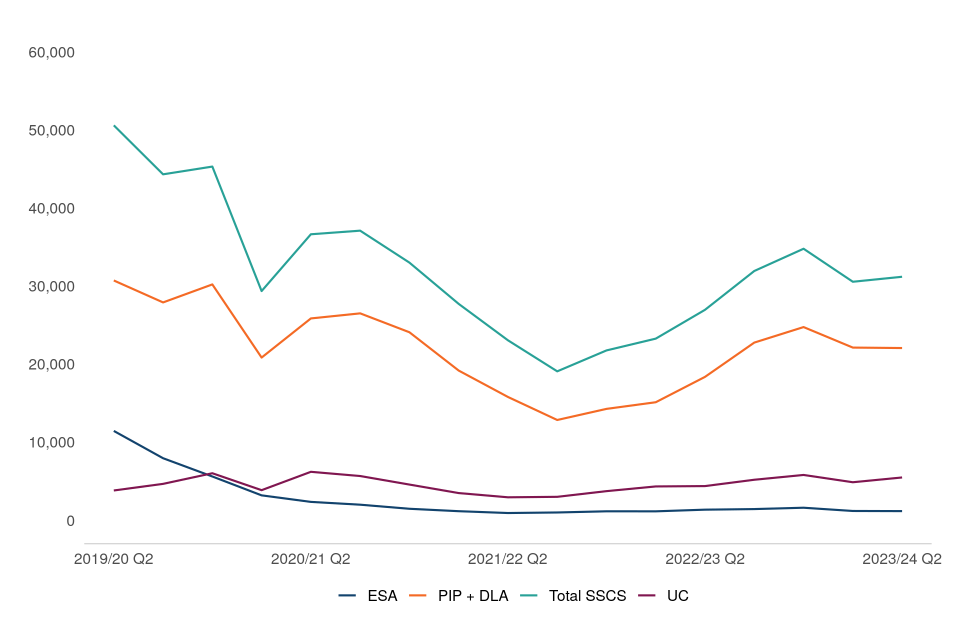
Figure 4.3: Social Security and Child Support caseload outstanding, Q2 2019/20 to Q2 2023/24 (Source: Tables S_4)
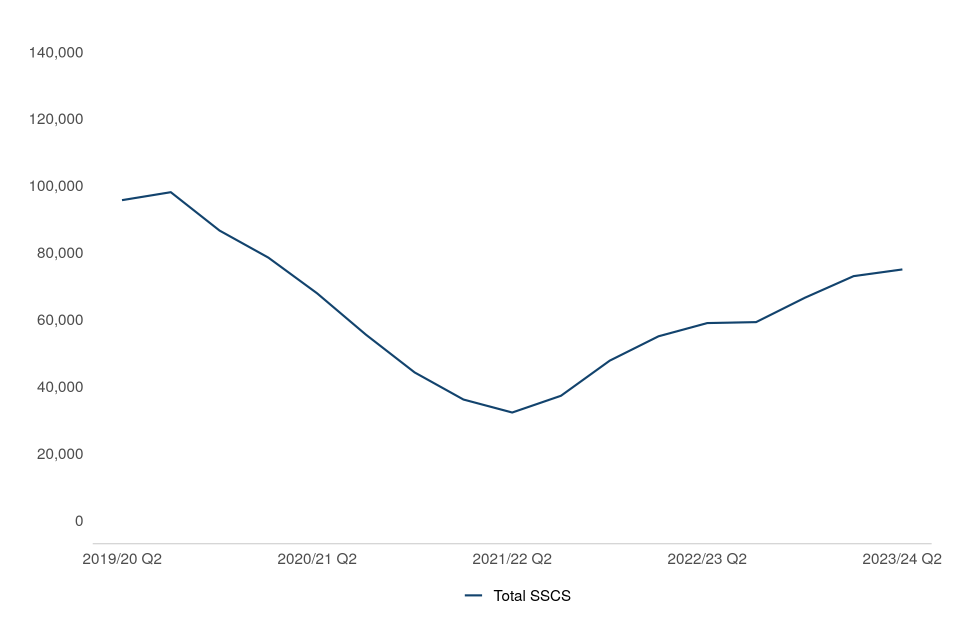
The economic impact of the COVID-19 pandemic resulted in an increase in the number of people on Universal Credit[footnote 3] as the employment rate decreased and economic inactivity increased. The Department for Work and Pensions (DWP) changes to benefit processes in response to the pandemic, such as the temporary suspension of face-to-face assessments for health and disability-related benefits, contributed to the general downward trend in receipts seen during the pandemic. As the policies put in place due to COVID-19 came to an end and restrictions were eased, SSCS receipts increased significantly from Q2 2021/22 and have continued to increase gradually in the latest 12 months reported.
SSCS receipts increased by 4% this quarter, to 36,000 appeals, compared to July to September 2022. This was driven by increases in Universal Credit and Attendance Allowance (by 35% and 87% respectively). PIP and UC appeals accounted for 66% and 18% respectively of all SSCS receipts in July to September 2023.
In July to September 2023, SSCS disposals increased by 16% when compared to the same period in 2022 (from 27,000 in Q2 2022/23 to 31,000 in Q2 2023/24). PIP made up two thirds of SSCS disposals (67%).
Of the disposals made by the SSCS tribunal, 20,000 (63%) were cleared at hearing, and of these, 61% were overturned in favour of the customer (down from 72% and no change from 61% on the same period in 2022 respectively). This overturn rate varied by benefit type, with PIP at 68%, Disability Living Allowance (DLA) 57%, Employment Support Allowance (ESA) 49%, and UC 51%. The PIP, DLA, ESA and UC overturn rates mostly decreased compared with July to September 2022 (PIP down 0, DLA down 4, ESA down 5 and UC down 1 percentage points).
There were 75,000 SSCS cases outstanding at the end of September 2023, an increase of 27% compared to the same period in 2022. SSCS cases outstanding decreased gradually between Q4 2017/18 and Q2 2021/22 (from a peak of 125,000 to 32,000), only rising in Q3 2019/20. However, SSCS caseload outstanding has started to rise again, increasing in each of the quarters since Q2 2021/22.
Of those cases disposed of by the SSCS tribunal in July to September 2023, the mean age of a case at disposal was 26 weeks, a 5 weeks decrease compared to the same period in 2022 (see table T_2).
5. Immigration and Asylum
First-tier Tribunal Immigration and Asylum Chamber (FTTIAC)
In July to September 2023, FTTIAC receipts increased by 10% to 10,000, compared to Q2 2022/23. Disposals increased by 7% (to 9,800), over the same period.
In the same period, caseload outstanding increased by 21% (to 31,000).
Figure 5.1: First-tier Tribunal Immigration and Asylum Chamber receipts, Q2 2019/20 to Q2 2023/24 (Source: Tables FIA_1)
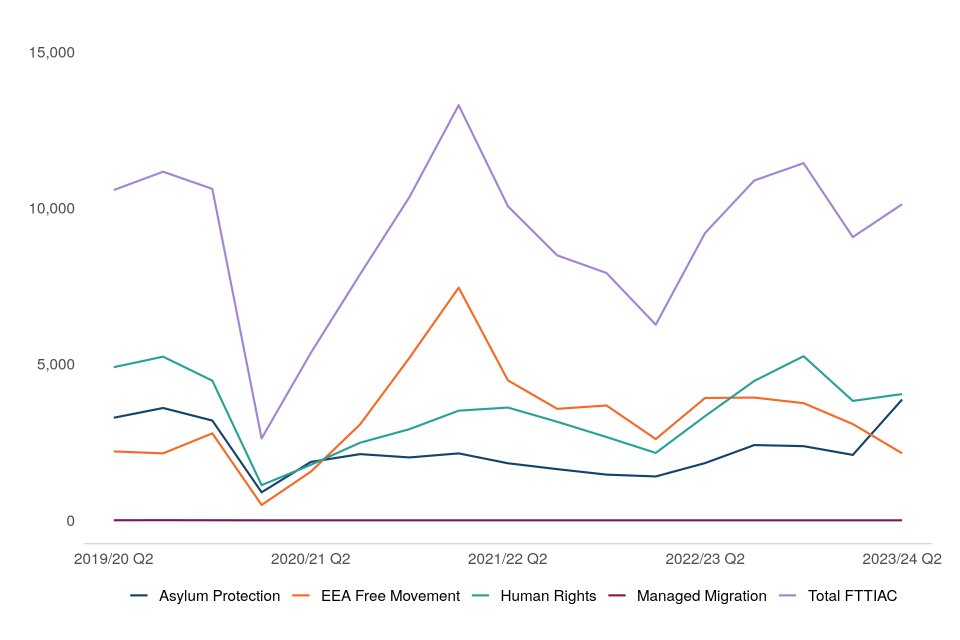
Figure 5.2: First-tier Tribunal Immigration and Asylum Chamber disposals, Q2 2019/20 to Q2 2023/24 (Source: Tables FIA_2)
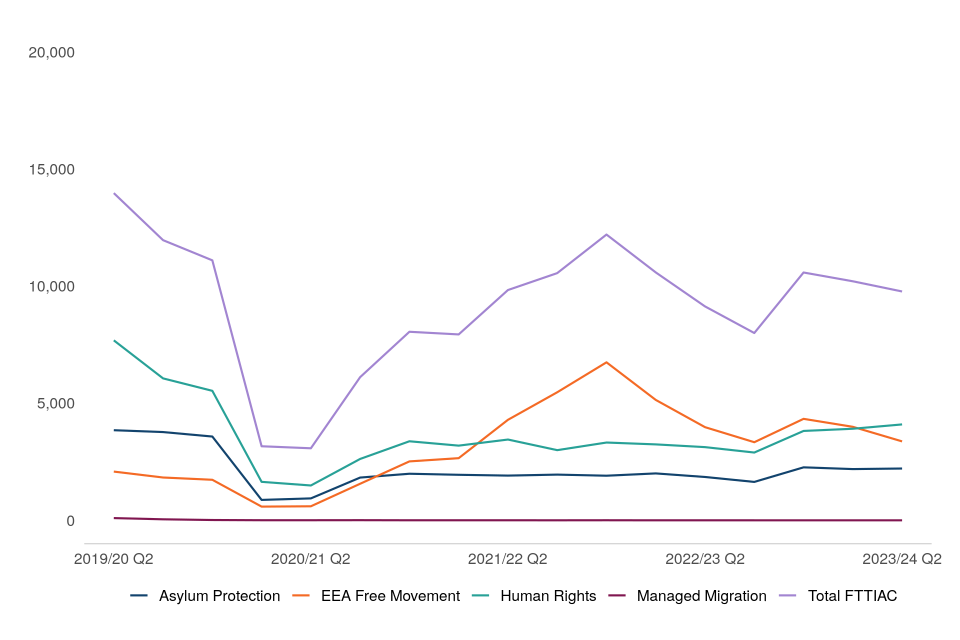
Figure 5.3: First-tier Tribunal Immigration and Asylum Chamber caseload outstanding, Q2 2019/20 to Q2 2023/24 (Source: Tables S_4)

Following on from a steep fall in 2020/21 due to the impact of the pandemic, FTTIAC receipts started to return to pre-Covid19 levels over the course of 2021/22. In 2021/22, FTTIAC receipts increased by 52% (to 40,000) compared to 2020/21 and over the course of 2022/23 decreased by 5% (to 38,000). This quarter receipts increased by 10% (to 10,000) compared to the same period last year.
The First-tier Tribunal Immigration and Asylum Chamber received 49 Deprivation of Citizenship receipts this quarter, a decrease of 46% compared to the same quarter last year. Deprivation of Citizenship disposals decreased by 40% compared to the same quarter last year (to 67).
The proportion of European Economic Area/European Union Settlement Scheme (EEA/EUSS) receipts has decreased since the EUSS route closed in June 2021, now making up 21% of all FTTIAC receipts. In July to September 2023, there were 2,100 EEA/EUSS receipts, a decrease of 45% compared to the same period last year.
Compared to Q2 2022/23, Human Rights (HR) receipts increased by 21% to 4,000. Asylum/Protection (AP) receipts increased by 111% compared to the same period in 2022 (to 3,900). HR and AP proportionally represented 40% and 38% of all FTTIAC receipts respectively (up 4 and up 18 percentage points respectively from a year ago).
In Q2 2023/24, FTTIAC disposals increased by 7% to 9,800. This rise in disposals was driven by increases in Human Rights and Asylum/Protection/Revocation of Protection (by 31% and 20% respectively). HR appeals made up the largest proportion (42%) of all FTTIAC disposals in July to September 2023, up from 34% a year ago.
Of the disposals made in the FTTIAC this quarter, 69% were determined i.e. a decision was made by a judge at a hearing or on the papers (compared to 72% in Q2 2022/23); 19% were withdrawn (compared to 17% in Q2 2022/23); 3% were struck out for non-payment of the appeal fee (compared to 3% in Q2 2022/23), and 4% were invalid or out of time (compared to 2% in Q2 2022/23). Around half (47%) of the 6,700 cases determined at a hearing or on the papers were allowed/granted, although this varied by case type (46% of Asylum/Protection, 51% of Human Rights and 44% of EEA Free Movement appeals were allowed/granted).
In the FTTIAC, the mean time taken to clear appeals across all categories is at 43 weeks this quarter, which is 2 weeks more than compared to the same period a year ago. Asylum/Protection, Human Rights and EEA Free Movement had mean times taken of 48 weeks, 42 weeks and 40 weeks respectively.
Upper Tribunal Immigration and Asylum Chamber (UTIAC)
In Q2 2023/24 UTIAC Judicial Review receipts increased by 3%, to 590, compared to the same period a year ago. Disposals decreased by 23% to 760 whilst caseload outstanding rose by 47%, to 1,400, compared to July to September 2022.
UTIAC Immigration and Asylum Judicial Reviews
In July to September 2023, there were 590 Immigration and Asylum Judicial Review receipts and 760 disposals, an increase of 3% and a decrease of 23% respectively on July to September 2022.
Of the 760 Immigration and Asylum Judicial Reviews disposed of, 46% were determined and 1% were transferred to the Administrative Court. The remaining 53% were in the ‘Other’ category, which includes cases that were withdrawn or not served.
During July to September 2023, 440 UTIAC Judicial Review applications were determined by paper hearing, of which 12% were allowed to continue to the substantive hearing stage. A further 39 were reconsidered at an oral renewal, of which 95% were allowed to continue to the substantive hearing stage. There were 14 substantive hearings which were determined in July to September 2023 of which 29% were granted in favour of the appellant (see table UIA_3).
6. Employment Tribunals
Employment Tribunal single cases
In Q2 2023, the Employment Tribunal received 7,400 single claim receipts and disposed of 7,700 single claim cases. There were 32,000 single claim cases outstanding at the end of September.
Employment Tribunal multiple cases
This quarter there were 12,000 Multiple claim receipts, 13,000 disposals and caseload outstanding stood at 438,000 at the end of September.
Employment Tribunals transitioned to a new database (Employment Case Management) during March to May 2021. It has not been possible to provide full results from both databases during this migration period on a consistent basis. Therefore, Employment Tribunal (ET) data is not available for Q1 2021/22, and as a result we are unable to present data for the full financial year of 2021/22. Jurisdictional breakdowns for disposals, timeliness and outcome data will be available once reporting commences on the ECM reform database. In addition, because of the operational differences between ECM and the previous database, caution should be exercised when making comparisons in the statistical results before and after migration.
Again, from September 2022, the Employment Tribunal moved some cases in specific areas to a new case management system (Reform ECM). A very small proportion of cases (less than 2,000) in the new system are not included in the statistics. The numbers involved are not large enough to impact on the trends seen in these statistics.
In Q2 2023/24, there were 20,000 Employment Tribunals (ET) receipts, 38% (7,400) of which were single claims receipts, and the remaining 62% (12,000) were multiple claims receipts. The ET disposed of 21,000 cases in Q2 2023/24. At the end of the financial year, 470,000 cases were outstanding.
Figure 6.1: Index of Employment Tribunals single and multiple claim receipts, Q2 2019/20 to Q2 2023/24 (Source: Tables S_2)
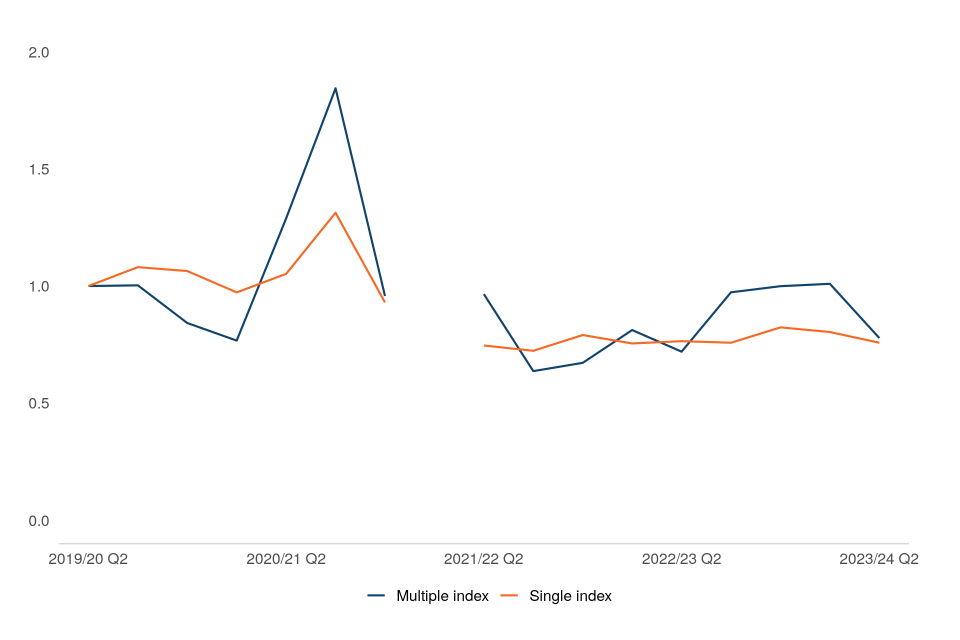
- Baseline 2019/20 Q2
Figure 6.2: Index of Employment Tribunals single and multiple claim disposals, Q2 2019/20 to Q2 2023/24 (Source: Tables S_3)
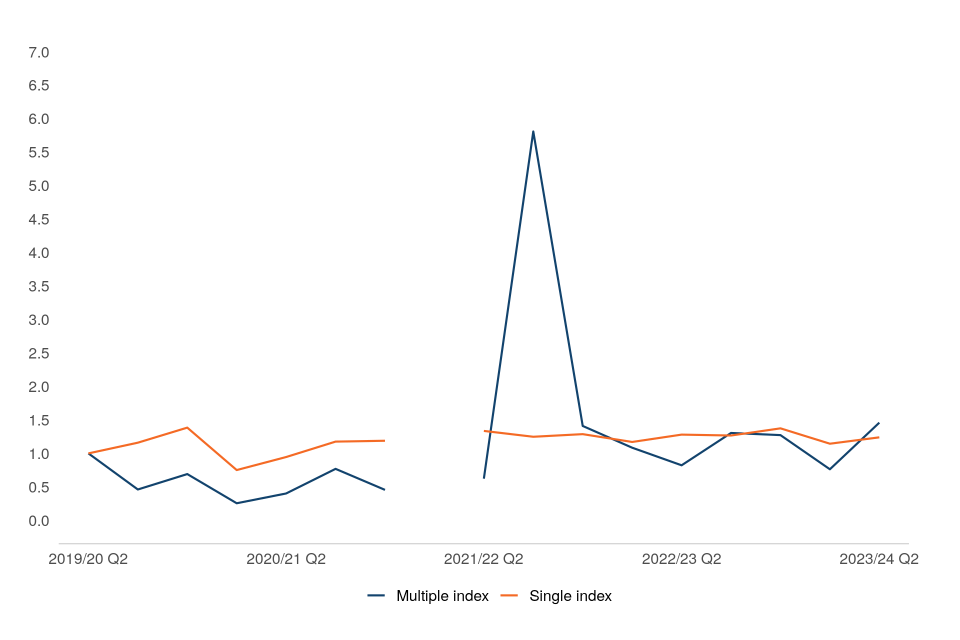
- Baseline 2019/20 Q2
Figure 6.3: Index of Employment Tribunals single and multiple claims outstanding, Q2 2019/20 to Q2 2023/24 (Source: Tables S_4)
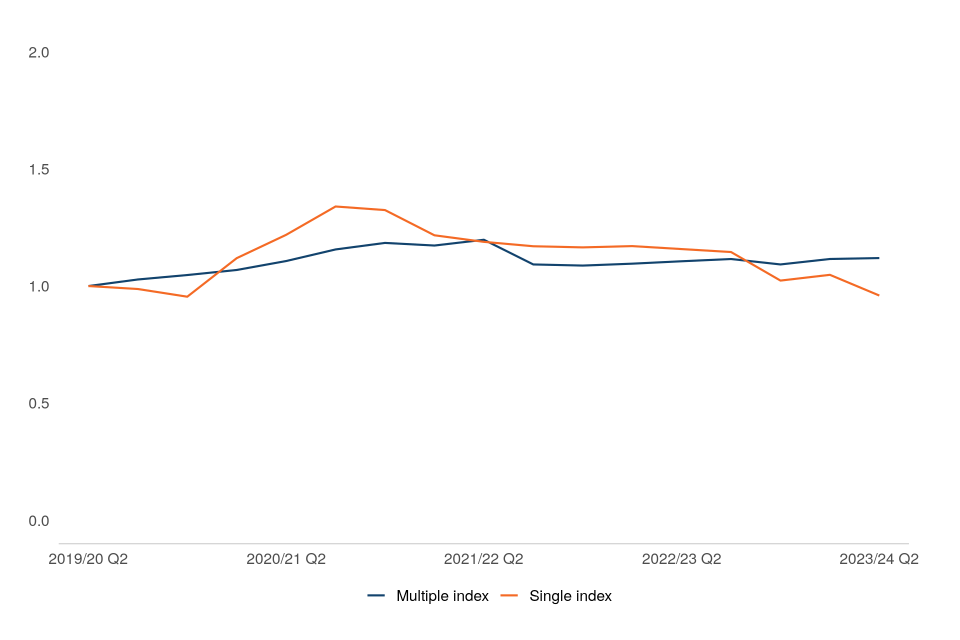
- Baseline 2019/20 Q2
Single claim receipts have returned to levels seen prior to the COVID-19 pandemic. Single claim caseload outstanding (at 32,000) has shown early signs of decreasing since Q4 22/23, now below the peak levels seen in 2009/10 (when it was 36,000 in Q2 of that year).
There were 12,000 multiple claims received this quarter. Multiple claims tend to be more volatile as they can be skewed by a high number of claims against a single employer.
The peak seen in the disposal chart in Q3 2021/22 is due to a large spike in multiple claims. A dismissal judgment was issued in December 2021 for 48,000 British Airways claims covering 71,000 jurisdictions. These claims had been withdrawn over a number of years but given the volume and restrictions with the old case management system these had not been formally closed until now, hence the spike. This figure is expected to be revised again as there is still closure action to take place on some of the claims.
7. Gender Recognition Certificates
370 Gender Recognition Panel (GRP) applications were received and 465 were disposed of between July to September 2023; 736 applications were pending by the end of September 2023
The GRP received 370 applications this quarter, an increase of 13 compared to July to September 2022. Of the 465 applications disposed of, a full Gender Recognition Certificate (GRC) was granted in 89% of cases (415 full GRCs), down 4 percentage points compared to the same period in 2022 (where 256 full GRCs were granted out of 275 disposals).
As expected, GRP receipts have increased annually since 2017/18, particularly more recently following a reduction in the application fee in May 2021 from £140 to £5, and the move to an online application process in July 2022. This has come at the same time as an increase in both the caseload outstanding and refusals. Caseload outstanding reached 736 cases in Q2 2023/24, while 8% of all disposals (35 cases) have been refused. Applications can be refused if they do not meet the required criteria. More information on the criteria can be found at the following link: Apply for a Gender Recognition Certificate - GOV.UK (www.gov.uk) (URL:https://www.gov.uk/apply-gender-recognition-certificate).
Since April 2005/06, when the Gender Recognition Act 2004 came into effect, 66% of interim certificates (171 of the 261 interim GRCs granted) have been converted to a full GRC, 52% of which were converted within 30 weeks. No interim certificates were converted to a full GRC between July to September 2023. Of the 415 full certificates granted in July to September 2023, 36 were for married applicants and 370 for single applicants. 227 (55%) of the individuals granted full certificates were registered male at birth while 188 (45%) were registered female at birth.
Figure 7.1: Applications for Gender Recognition Certificates received, disposed of and pending, Q2 2019/20 to Q2 2023/24 (Source: Tables GRP_1 and GRP_2)
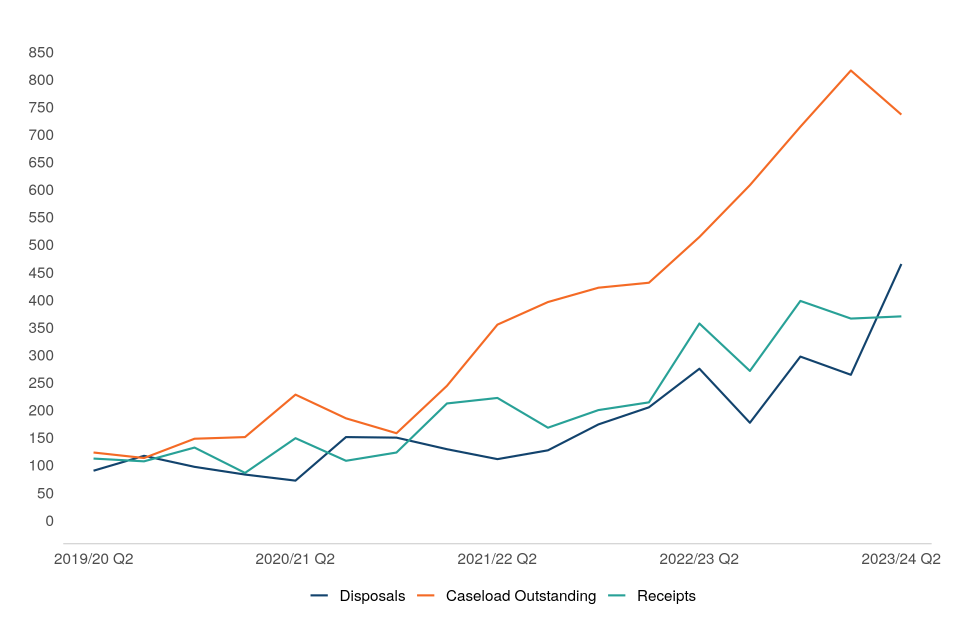
Figure 7.2: Full Gender Recognition Certificates granted by year of birth, 2018/19 to 2022/23 (Source: Table GRP_4)
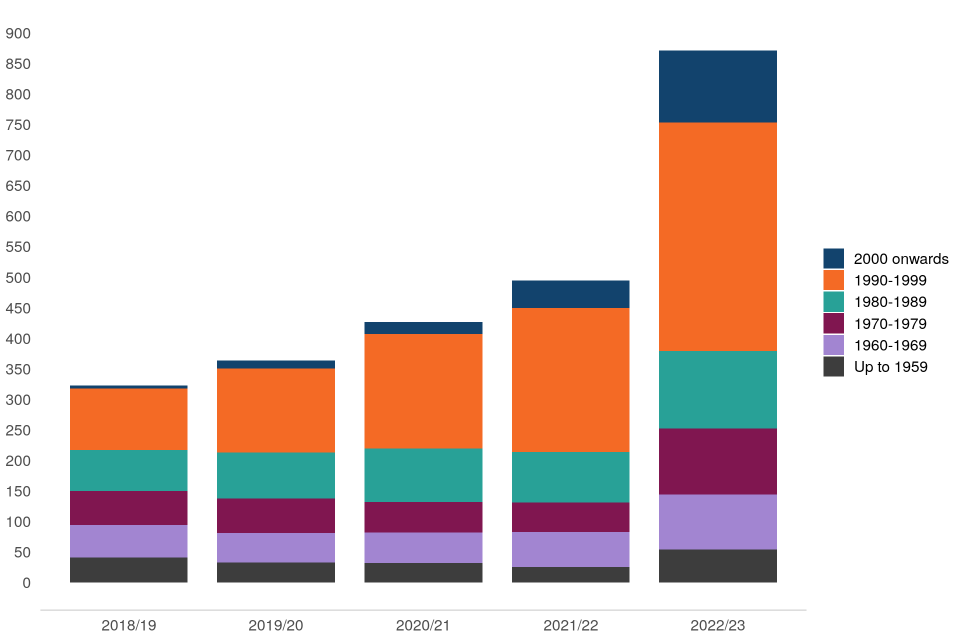
8. Annual Special Educational Needs and Disability (SEND) Statistics
A new breakdown of Section I (which names the school that a child should go to) appeal outcomes by type has been added to the annual SEND tables and can be found in SEND_11 of the tables published alongside this bulletin.
MoJ’s Access to Justice Data Science team have developed this analysis by extracting additional detail about the outcomes of an appeal from decision notices (written documents issued by the tribunal outlining the evidence relating to an appeal and any final recommendations) stored as PDF files to provide more in-depth insight into outcomes from the SEND tribunal.
For any feedback on this analysis, please contact us via email address given below.
24% increase in registered SEN appeals when compared to 2021/22 academic year
In the academic year 2022/23, HMCTS tribunals recorded 14,000 registered SEN appeals, an increase of 24% when compared to the prior year. In the same period, 12,000 SEN appeals were disposed of, an increase of 29% on 2021/22.
The increase in appeals registered is likely a continued effect of the 2014 SEN reforms which introduced Education Health and Care plans (EHCPs) and extended the provision of support from birth to 25 years of age and the effect of the National Trial which began in April 2018. Under the National Trial the Tribunal was able to make non-binding recommendations on the health and social care elements of the EHC plan. Those provisions were mainstreamed with effect from 1 September 2021.
Figure 8.1: Registered SEN appeals, 2016/17 to 2022/23 academic years (Source: Table SEND_1)[footnote 4]
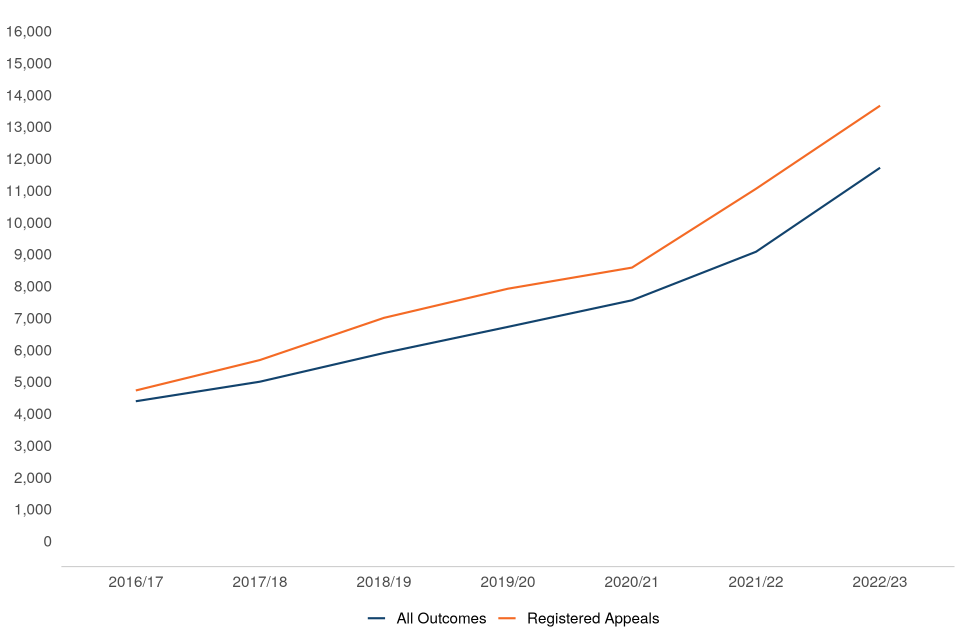
Of the 14,000 registered SEN appeals in 2022/23, 28% were against ‘refusal to secure an EHC assessment’, while a total of 58% were in relation to the content of EHC plans. The most common type of educational need identified in appeals continues to be Autistic Spectrum Disorder, accounting for 45% (6,200) of all SEN appeals.
SEND caseload outstanding reached a new high of 6,700 cases in Q2 2023/24 financial year, driven by the previously noted rising trend in SEND appeals registered.
Figure 8.2: SEND Caseload Outstanding, Q2 2019/20 to Q2 2023/24 (Source: Table S_4)[footnote 4]
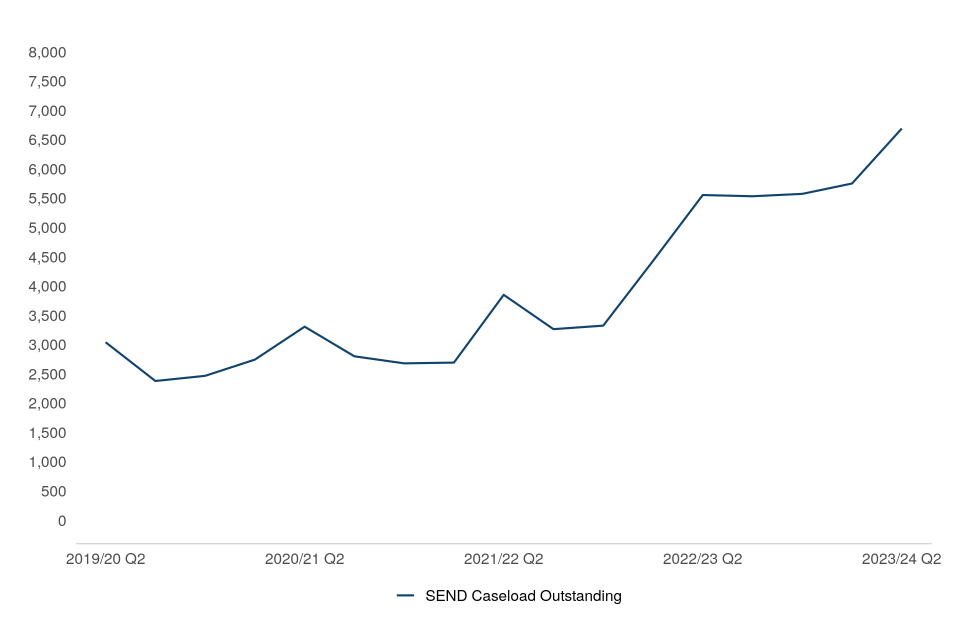
In 2022/23, ethnicity data was ‘not completed’ for any of the appeals registered, therefore it is not possible to provide analysis of SEN appeals by child ethnicity. As the table on ethnic origin (previously SEND_4) provides no new information, it has been removed from this publication. We will monitor the data regularly and reintroduce this table when the data is populated.
In 2022/23, HMCTS recorded 12,000 outcomes in relation to SEN appeals, an increase of 29% compared to 2021/22. Of these outcomes, 68% (8,000) of cases were decided by the tribunal, up 6 percentage points on 2021/22. Of the cases decided, 98% (7,800) were in favour of the appellant, up 2 percentage points on 2021/22.
In 2022/23, there were 330 registered appeals in relation to disability discrimination, 137 more than the previous year (71% increase). Of these appeals, 20 (6%) were related to temporary exclusion from school and the remainder were uncategorised.
The SEND tribunals disposed of 160 Disability Discrimination claims in 2022/23, up from 135 in the previous year (20% increase). Of these disposals, 94 claims (58%) were decided at hearing, 65 appeals (40%) were withdrawn prior to the hearing taking place, and 3 appeals were conceded. Of those decided at hearing, 64% were dismissed and 36% upheld – compared to 71% dismissed and 29% upheld in 2021/22.
Of the 464 Section I decision notices analysed for academic year 2022/23, 153 (33%) resulted in the parent preference, 124 (27%) resulted in the parent and LA preference (this is when at a hearing, the LA agrees with the parent), 52 (11%) resulted in the LA preference and 46 (10%) resulted in neither (this is when the type of school is in contention and the court determines the type of school), whilst the rest (19%) could not be determined, either due to the absence of relevant information within the decision notice or limitations of the data science method used.
Outcomes also differ by educational need with cases for Autistic Spectrum Disorder and Moderate Learning Difficulty (which make up 66% of the notices) resulting in the parent or parent and LA preference in 58% and 63% of cases respectively.
9. Further information
Rounding convention
Figures greater than 10,000 are rounded to the nearest 1,000, those between 1,000 and 10,000 are rounded to the nearest 100 and those between 100 to 1,000 are rounded to the nearest 10. Less than 100 are given as the actual number.
Accompanying files
As well as this bulletin, the following products are published as part of this release:
-
A supporting document providing further information on how the data is collected and processed, as well as information on the revisions policy and legislation relevant to trends and background on the functioning of the tribunal system.
-
The quality statement published with this guide sets out our policies for producing quality statistical outputs for the information we provide to maintain our users’ understanding and trust.
-
A set of overview tables, covering each section of this bulletin and an annual set of tables covering further breakdown of Special Educational Needs and Disability statistics for the Academic Year 2022/23.
-
A set of CSV files including data on overall receipts and disposals CSV, covering all tribunal types.
-
Additional releases this quarter:
-
Update to the statistical notice on Immigration and Asylum (I&A) Detained Immigration Appeals (DIA) to include data to Q2 2023/24.
Future publications
Our statisticians regularly review the content of publications. Development of new and improved statistical outputs is usually dependent on reallocating existing resources. As part of our continual review and prioritisation, we welcome user feedback on existing outputs including content, breadth, frequency and methodology. Please send any comments you have on this publication including suggestions for further developments or reductions in content.
Official Statistics
Our statistical practice is regulated by the Office for Statistics Regulation (OSR).
OSR sets the standards of trustworthiness, quality and value in the Code of Practice for Statistics that all producers of official statistics should adhere to.
You are welcome to contact us directly with any comments about how we meet these standards.
Alternatively, you can contact OSR by emailing regulation@statistics.gov.uk or via the OSR website.
Contact
Press office - email: pressofficecourtslaw@justice.gov.uk
Other enquiries and feedback on these statistics should be directed to the Data and Evidence as a Service division of the Ministry of Justice:
Rita Kumi-Ampofo or Laura Jones - email: CAJS@justice.gov.uk
Next update: 14 March 2024 (URL: www.gov.uk/government/collections/tribunals-statistics)
© Crown copyright Produced by the Ministry of Justice
For any feedback on the layout or content of this publication or requests for alternative formats, please contact CAJS@justice.gov.uk
-
The interim totals for the overall volumes of tribunal receipts, disposals and open caseload exclude the Upper Tribunal (Immigration and Asylum Chamber) for which the data is currently not available. See the main tables S_2, S_3 and S_4 for more information. ↩ ↩2 ↩3 ↩4 ↩5 ↩6 ↩7 ↩8 ↩9 ↩10 ↩11 ↩12 ↩13 ↩14
-
Open caseload is based on a snapshot in time based on the last day of each quarter. ↩
-
The underlying data for Figure 9.1 is the Special Educational Needs (SEN) appeals and outcomes for each academic year (1st September to 31st August) which can be found in SEND_1. The underlying data in Figure 9.2 for the caseload outstanding trendline is from the Special Educational Needs and Disability (SEND) caseload outstanding as at Q2 of each year which can be found in S_4 of the main tables. ↩ ↩2
